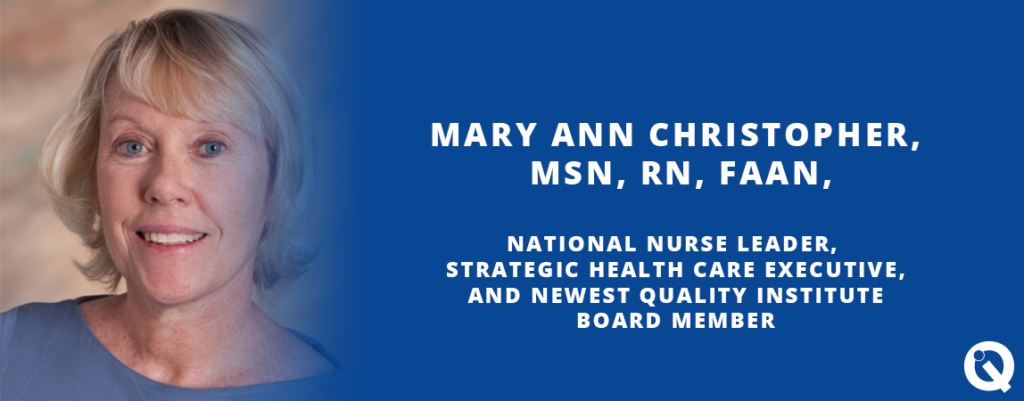Mary Ann Christopher, MSN, RN, FAAN, recently joined the Board of the Quality Institute. Ms. Christopher is a nationally known nurse leader and strategic health care executive. She is a former corporate officer at Horizon Blue Cross Blue Shield of New Jersey and past President and Chief Executive Officer of Visiting Nurse Services of New York and Visiting Nurse Association Health Group of New Jersey.
Why did you want to join the Quality Institute Board?
I’ve been a longtime champion of the work of the Quality Institute. I’ve always ascribed to the work of the Institute as a convener and thought leader on issues relative to the individual and to public health in New Jersey — and beyond. It really is an honor for me to join.
In your former role with Horizon Blue Cross Blue Shield of New Jersey, you worked closely with the Quality Institute on the Conversation of Your Life (COYL) program. Now, as a Board member, how do you hope to impact our work on Advance Care Planning in New Jersey?
I think there are follow-up initiatives as a natural outgrowth of COYL, such as to drive universality in the academic curricula and in the health professions in New Jersey relative to palliative care. There’s an opportunity to participate in a multi-stakeholder interprofessional round table, where best practices in team-based approaches to palliative care can be fully explored — with an emphasis on a multicultural focus because New Jersey is such a richly diverse community. COYL is founded on the belief in a ground-up approach to conversations that drive the palliative care journey. It would be interesting to look for ways to embed that understanding and that competency in both faith-based ministries and community health workers — under the power of the grassroots approach to end-of-life discussions and, along with that, to work with providers and payers to really explore payment models that would sustain palliative care.
Another opportunity would be to think about ways to build on the newly adopted CMS focus on expanding opportunities for primary care adoption of palliative care, particularly in collaboration with home-based providers. Finally, I think the other expansion opportunity for COYL is the self-insured market in New Jersey.
As a longtime leader of large home and hospice caregiver entities, what safety policy or payment system changes do you think are needed during this pandemic to protect health care workers and patients?
I don’t think that home-based and community-based care should be tied to a homebound status. I think we have to also look at rate adjustments to accommodate the increased expense for PPE during this time. There should be adequate funding for emotional support for home and community-based teams that have responded to the COVID-19 crisis because we can expect to see ongoing post-traumatic stress. Home and community-based teams are frequently isolated because they’re not in a facility setting.
We should be reimbursing telehealth for home-based and community-based providers. We should be fully embracing hospital at home, which is a practice methodology that essentially allows almost an acute level of care to occur in the home and often, frankly, patients are safer in the home. During previous public health crises — tuberculosis is an example — home and community-based providers frequently acted as extensions to local health departments. As we think about deploying community surveillance teams to test and trace, why wouldn’t we look to home and community-based providers to provide that since they already are embedded in every community that is at risk?
You have been a proponent for alternative payment models and value-based care. Given the current public health crisis, do you see a place for these efforts to continue to strengthen our health care system?
Value-based payment is not just about money; it’s about driving quality and ensuring access. When you think about the extraordinary disparities that were highlighted through this crisis, a way to mitigate those disparities over time is to ensure that people have access to quality patient care at the right cost. I think value-based payment is a significant variable in ensuring that we do better as we move forward.
We like to let our members learn something about the experts we interview beyond their professional lives. What might we see you doing outside of work?
I have a wonderful home in Avon-by-the-Sea, a block and a half from the beach. We have four children, two of whom are married, and two grandsons and a new granddaughter. I also love to read; I have been taking online courses in art history and English literature. And I love ballet.

